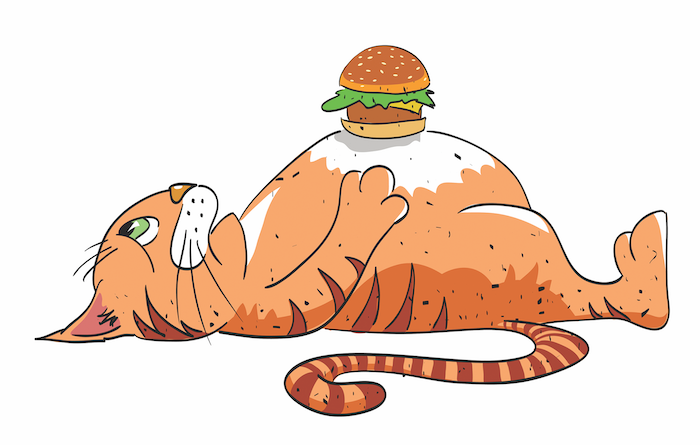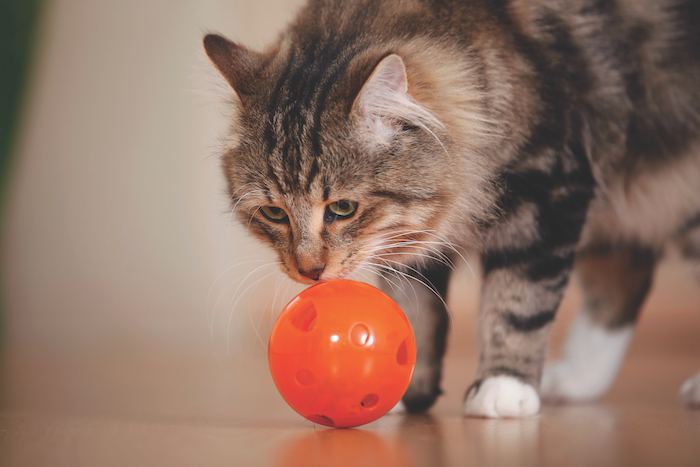How to Help Your Cat Lose Weight
The post How to Help Your Cat Lose Weight by Arden Moore appeared first on Catster. Copying over entire articles infringes on copyright laws. You may not be aware of it, but all of these articles were assigned, contracted and paid for, so they aren't considered public domain. However, we appreciate that you like the article and would love it if you continued sharing just the first paragraph of an article, then linking out to the rest of the piece on Catster.com.
You enter the new year with ambitious resolutions to eat more kale and less chocolate. Or to spend more time at the gym and less at happy hours. Let’s be realistic. Within a few weeks of the new year, chances are that you’ve already abandoned self-directed health goals.
But you may be more motivated to stick with New Year’s resolutions for your BFF — your best feline friend. Yep, we’re referring to your cat who is doing more waddling and napping than climbing and romping.
Take it from Danielle Clem, veterinarian and hospital director at the San Diego Humane Society. Practicing what she preaches, she safely helped her cat, Warren — a large, brown-striped tabby that arrived at the shelter weighing 15 pounds. He was adopted but returned a year later weighing a staggering 25 pounds.
“I took him in as a foster to get him to a healthy adoptable weight but fell in love with him,” says Dr. Clem, who also works with the shelter staff to employ weight-loss strategies for other animals to increase their chances at adoption and to reduce their risks for health issues. “It took 14 months to get him back down to an ideal body weight of 16 pounds. Now he is healthy, playful, and we can see his full, beautiful personality.”
Extra pounds = problems
Fat cats may look cute and cuddly on the outside, but they are at risk for a slew of health issues. “Many of the severe illnesses, such as heart disease, diabetes, pancreatitis, cancer and arthritis are associated with obesity,” Dr. Clem says. “There is a lot of strain carrying extra weight on a cat’s joints, and excess weight can shorten a cat’s life span.”
Cats are fastidious about maintaining shiny coats through grooming sessions throughout the day. But overweight cats can develop matted fur due to the inability to reach parts of their bodies to groom. Behavior-wise, some overweight cats become food bullies, pestering their people constantly for snacks and swiping food from plates.
Is My Cat Fat?
To determine if your cat is big-boned and at a healthy weight or needs to lose a few pounds, do the rib test.
You should be able to feel your cat’s ribs by moving your fingers across his body. You should also be able to see an hourglass shape when you stand over and look at your cat from above.
For more tips on dealing with your overweight cat, visit the Association for Pet Obesity Prevention website founded by Ernie Ward, DVM, at petobesityprevention.org.
Time for a plan. To begin your Feline Fat-Free New Year’s Resolution, heed advice from Dr. Clem: Go slow and steady.
Step 1: Recruit your veterinarian. “The first step is to talk with your veterinarian and work together to institute a safe, effective weight-loss program specific to your cat,” she says. “Crash diets can be dangerous. Your cat can become highly stressed and at high risk for hepatic lipidosis, or fatty liver disease, which is life-threatening and can cause irreparable damage to all organs.”
Gradually switch to foods that contain high protein and low carbohydrates to maximize the nutrition your cat receives with each bite.
Step 2: Celebrate small drops in weight. The healthy weight loss pace for cats should range between shedding 1 to 2% of the total body weight per week.
“If you have an obese cat — one who weighs 30% above a healthy weight — you need to practice patience and dedication,” Dr. Clem says. “It can take over a year for your cat to reach his ideal weight, as was the case with Warren.”
Take your cat to your veterinary clinic once a week to place him on a pet scale to measure his weight down to the ounce. These visits may also help get your cat used to veterinary visits. For at-home weigh-ins, try using a digital luggage scale. Place your cat in a carrier with the digital luggage scale and measure the total weight. Then weigh the carrier alone and subtract the difference to determine your cat’s accurate weight.
Step 3: Treat your cat to calorie- free play sessions. “Instead of food in the bowl, try putting your cat’s measured portion in a treat ball at dinner and roll it on the floor for him to figure out how to access the kibble,” Dr. Clem says. “Treat dispensers give cats something to work on and prevent gobbling down food. Start slow with toys like feathered wands for your cat to swat in short exercise sessions.”
Step 4: Become your cat’s personal stylist. Regular brushing and grooming sessions prevent mats from developing in your cat’s coat and release healthy oils for that shiny coat look.
“A lot of overweight cats have difficulty grooming themselves and can develop not only mats, but yeast and urine infections,” she says. “Treating your cat to daily brushing can also be a bonding activity that increases the connection between you and your cat.”
Step 5: Celebrate your new, slimmer cat. Motivate others by posting before and after photos of your cat on social media outlets. Maintain weekly weigh-ins and measure food (including treats) so your cat does not gain back added pounds.
“With Warren, we spoil him in many ways that do not involve food,” Dr. Clem says. “He likes sporting bow ties, so we had several made for him, and he now likes playing with toys. He is almost 8 years old and has much more energy and is much more playful.”
Read Next: 10 New Year’s Resolutions Cats Make
The post How to Help Your Cat Lose Weight by Arden Moore appeared first on Catster. Copying over entire articles infringes on copyright laws. You may not be aware of it, but all of these articles were assigned, contracted and paid for, so they aren't considered public domain. However, we appreciate that you like the article and would love it if you continued sharing just the first paragraph of an article, then linking out to the rest of the piece on Catster.com.






Post a Comment